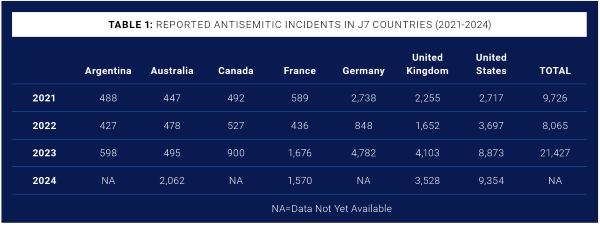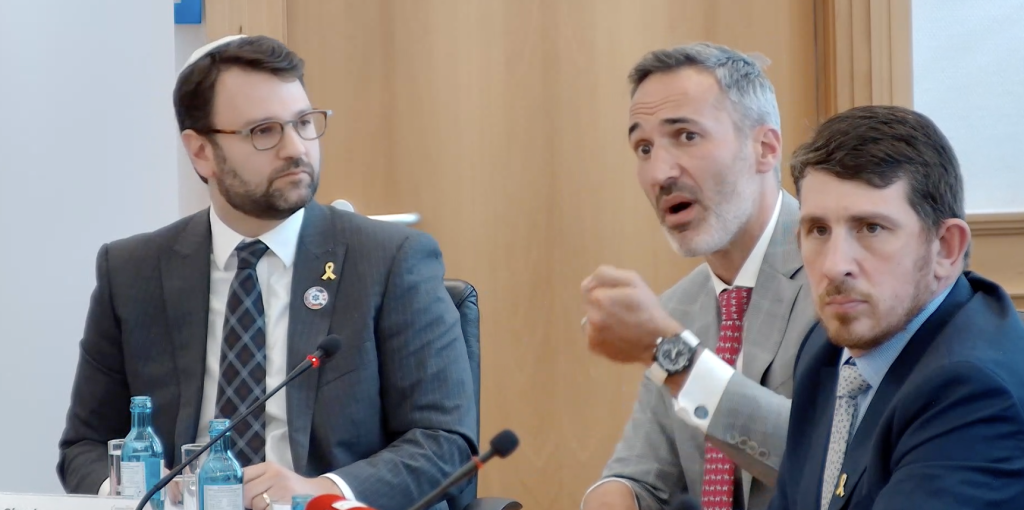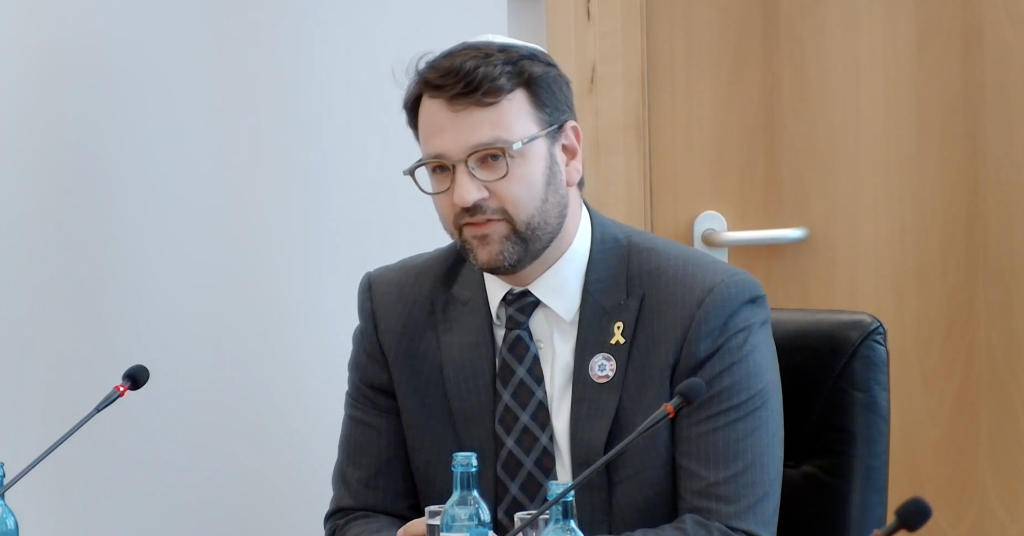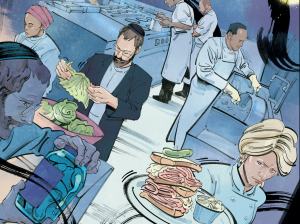The ongoing increase in antisemitism seen in Canada before and since Oct. 7, 2023, is part of a rising tide of global antisemitism affecting the lives of Jews around the world, according to an inaugural report released by the J7, the Large Communities’ Task Force Against Antisemitism.
From Berlin, leaders from the world’s seven biggest Jewish diaspora communities—Canada, Britain, the United States, Australia, Argentina, France and Germany—delivered the report and spoke at a press conference on May 7 to “highlight dramatic rises in both the total number of antisemitic incidents and antisemitic incidents per capita” in the seven countries.
The antisemitic incidents contained in the inaugural J7 report “had been driven in part by the aftermath of the Oct. 7, 2023, terrorist massacre in Israel,” read a joint statement following the press conference in Germany, which coincided with the 80th anniversary of the end of the Second World War.
Each of the seven countries’ large Jewish agencies or advocacy groups authored the report for their country, which in turn went into the final J7 report that identified trends across the nations.
The Centre for Israel and Jewish Affairs (CIJA) authored the Canadian report.
The trends include “a rise in violent antisemitic incidents; repeated targeting of Jewish institutions including synagogues, schools, and community centres; an escalation of online hate; growing insecurity leading some Jews to hide their identity; and government failure to hold accountable those who engage in antisemitic violence or support terrorism against the Jewish state.”
Speaking to reporters in Berlin and online, Dr. Josef Schuster, president of the Central Council of Jews in Germany, invoked the commemoration of the end of the Holocaust and the need to vocally support “the culture of remembrance” of what happened in Germany and across Europe 80 years ago.
“We are seeing a growing indifference in Germany, even to the point of relativizing the Shoah, even empowerments,” said Schuster. “And this has consequences. Ten percent of teenagers and young adults in Germany have never heard of the Shoah. They don’t even know the term ‘Auschwitz.’ Forty [percent] don’t know that around six million Jews were murdered in the Shoah… Fifteen [percent] are of the opinion that there were less than two million.”

Marina Rosenberg, senior vice-president of the Anti-Defamation League in the United States, pointed to attacks on Jews and their institutions in the seven countries.
“Violence is brutally real, from arson attacks on synagogues in Australia to shootings at Jewish schools in Canada. From an assault of a female student in Frankfurt in Germany to the rape of a 12-year-old girl in France,” she said, referencing gunfire incidents that damaged Bais Chaya Mushka, a Jewish girls’ school in Toronto, in three separate overnight occurrences in 2024.
“This is our reality across all seven countries. We’re seeing the same traveling patterns: more violence; targeted attacks on synagogues and Jewish schools; rampant online hatred… Jews increasingly hiding their identity out of fear, and governments failing to hold perpetrators accountable,” Rosenberg said.
“This is exactly why we formed the J7 task force, to bring together the seven largest Jewish communities outside of Israel and say, with one voice, ‘Enough is enough.’”
Rosenberg called for every country to “adopt and implement… global guidelines for countering antisemitism, practical steps to ensure Jewish communities can live safely and with dignity.”
“Let’s be clear, when hatred against Jews becomes acceptable and normalized, it undermines the very foundation of our democracies,” she said. “The most meaningful tribute to Holocaust victims is not found in monuments, but in ensuring the Jewish communities can thrive without fear.”

The data contained in the task force’s report spans either three or four years per country: Canada’s data on antisemitic incidents, taken from Statistics Canada’s police-reported crime statistics, covers 2021 to 2023, as full data for 2024 was not yet available. Data for 2024 was included for the United States, Australia, France and Britain.
“Preliminary data from J7 members, including Canada and Germany, indicate that antisemitic incidents have either continued to rise or remained at historically high levels,” read a J7 press release, issued by CIJA, following the press conference.
A prescient decision in mid-2023
The J7 Large Communities’ Task Force Against Antisemitism was formed in July 2023 to develop strategies and share best practices in combatting hate.
The formation of the task force turned out to be a prescient move, said Alex Ryvchin, the co-CEO of the Executive Council of Australian Jewry.
“I would say we understood, then, that I suppose the writing was on the wall,” said Ryvchin. “Post-October 7, we very much used this network as therapy, as catharsis, but [as a forum] also, to steer our communities through the most damaging and difficult time in, for many of us in the histories of our communities.”
According to the report, the 83 percent rise in antisemitic incidents in Canada, for the period from 2021 to 2023, mirrors that of other communities like that of the U.K.
“From 2021 to 2023, antisemitic incidents spiked by 11 percent in Australia, 23 percent in Argentina, 75 percent in Germany, 82 percent in the U.K., 83 percent in Canada, 185 percent in France, and 227 percent in the U.S.,” read the press release following the report’s publication.
Speaking as the Canadian representative, Noah Shack, CIJA’s interim president, told reporters that “immense” challenges are facing the country’s Jewish community.
“Schools shot at synagogues, firebombed; Jewish-owned businesses vandalized; People harassed and assaulted in the streets,” said Shack.
“It’s essential that our new Parliament act quickly and decisively to deliver serious impact in the fight against antisemitism. It’s not just the safety and well-being of our community that’s at stake, but the future of [a] Canada where everyone can live free from hate and discrimination.”

The experiences of American college students since Oct. 7 was telling for Betsy Berns-Korn, the chair-elect of the Conference of Presidents of Major American Jewish Organizations, who said Jewish students in the U.S. were “almost immediately… even the day, the afternoon of October 7th, were targeted, were harassed,” and “some of them felt uncomfortable going back to their dorms.”
“Mezuzahs were taken off of their rooms. It was impossible to walk across campus because of the protests,” she said. “And as upsetting as that was, it was very frustrating to see so many administrations on these college campuses really have a double standard for these Jewish kids. They would not have allowed this to happen with any other minority student, or really any other student.”
Berns-Korn described a disappointing response from some schools to their Jewish university students.
“I heard firsthand… I spoke at some of these campuses where the kids that talked about being harassed and complained… they were told to go to mental health services, so their complaints were [made to look like] it was their fault, and it was really upsetting.”
While Berns-Korn says things are improving this year, students who are 18 to 20 years old “weren’t equipped to deal with” the incidents, nor the responses from administrators.
Following her comments, Shack shared an incident from Canada that he said “illustrates the phenomenon” of the need to educate school and university administrators to better handle antisemitic incidents related to Israel.
An 11-year-old girl, who was one of the only Jewish kids in her school, became the target of a protest against the Jewish state after Oct. 7, he said.
“Some other students, at the behest of a teacher, staged an anti-Israel protest that quickly turned into her being swarmed by around 40 students, I believe, being shouted at that ‘Jews don’t deserve to live’ that ‘the Jews should die’ that she ‘doesn’t belong here,’” said Shack.
“Vicious bullying and intimidation led to an assault. And the outcome of all of this wasn’t any discipline for the students involved. No educational program brought into the school. No lessons learned… the 11-year-old student was removed from her class and ultimately had to switch to a different educational institution in order to be safe,” he said.
“That’s not the Canada that I grew up [in]. That’s not what liberal democracies are supposed to look like. That’s not what accountability for hate needs to be. Yet that’s the situation we’re facing.”







